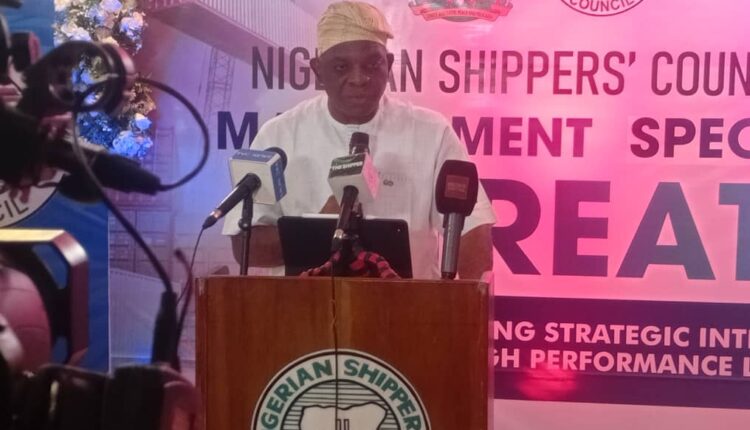NSC Retreat: Akutah rallies Team Shippers’ Council for result oriented governance, hails Tinubu’s reform
Maureen Aguta
The Executive Secretary and CEO of the Nigerian Shippers’ Council (NSC), Barrister Akutah Pius Ukeyima, has applauded President Bola Ahmed Tinubu, for his visionary leadership in repositioning Nigeria’s maritime sector as a pillar of national economic transformation, declaring that performance—not process—will now define the Council’s identity.
Delivering a powerful keynote address at the 2025 NSC Management Special Retreat, holding from July 23 to 24 at De Phantom Continental Hotel, Lekki, Akutah praised the establishment of the Federal Ministry of Marine and Blue Economy as a courageous and strategic move under the President’s Renewed Hope Agenda.
“Mr. President has injected a new sense of urgency and clarity into our nation’s strategic sectors,” Akutah said. “The creation of this Ministry signals the dawn of a new era. We must rise to meet it.”
He also commended the Minister of Marine and Blue Economy, H.E. Adegboyega Oyetola, for his visionary leadership, tireless commitment, and reform-focused approach, which he said has galvanized agencies under the ministry to embrace innovation and measurable impact.
With the theme “Achieving Strategic Intents Through Performance Lens,” the retreat marked a bold pivot toward results-oriented governance at the Shippers’ Council. Akutah used the occasion to unveil a new strategic direction for the Council (2025–2029), issuing direct policy instructions and performance mandates to all departments and units.
“We can no longer be a paper-heavy, process-driven bureaucracy,” he warned. “The future belongs to institutions that deliver results. The Nigerian Shippers’ Council must lead by example.”
The directives announced include:
Mandatory digitization: Full deployment of the Enterprise Content Management (ECM) system across all departments by December 2025, with all internal processes and documentation fully digitized.
Real-time performance tracking: Regulatory Services and ICT departments to develop an integrated dashboard for vessel turnaround and cargo dwell times.
KPI-based staff evaluation: All staff to be assessed through individual performance contracts, which will influence promotion, postings, and recognition.
Public accountability: Quarterly stakeholder forums, regulatory newsletters, and a formal complaint-resolution tracker to enhance transparency and engagement.
Infrastructure execution: Inland Transport Services and Zonal Coordinators to fast-track delivery on major infrastructure projects such as the Jos Inland Dry Port, Kano Dala IDP, Potiskum VTA, and Gateway IDP (Ogun).
“From this moment, performance is not optional. It is the new culture. We must deliver or step aside,” Akutah affirmed.
The ES concluded on a high note, with renewed clarity on the Council’s mandate as both a policy anchor and delivery engine within Nigeria’s marine economy. He reiterated his commitment to provide all necessary tools, support, and oversight to enable successful implementation—but also warned that non-performance would no longer be tolerated.
“This retreat must be remembered not just as an event—but as a turning point,” he stated. “We owe it to the President, to the Minister, and to the Nigerian people to deliver real, measurable change.”
Earlier in his welcome address, the Director of Strategic Planning and Research, Mr. Rotimi Anifowose, set the tone for the retreat by describing it as a defining moment in the Council’s journey toward institutional excellence.
He emphasized that the validation of the Council’s strategic planning report and the signing of the performance bond signified far more than formality — they represent a culture shift.
“Today marks a significant step in the evolution of our organization,” Anifowose said. “The validation of our strategic report and the performance bond we’re signing are bold affirmations of shared accountability and our collective ownership of progress.”
According to the Director, the planning session that preceded the retreat had been reflective and participatory — realigning the Council’s vision and mission with both transitional realities and national economic ambitions.
“This performance bond is not ceremonial,” he emphasized. “It’s a leadership contract. A pledge to ourselves and to the Executive Secretary that results—not intentions—will shape the months and years ahead.”
Anifowose commended the Executive Secretary for his unwavering commitment to strategy and performance, and called on all departmental heads to fully embrace this new era of disciplined execution.


